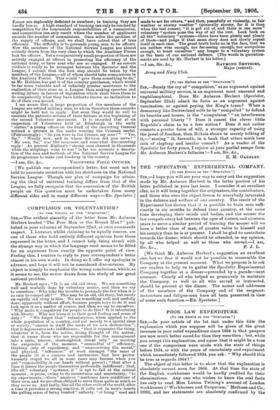COMPULSION OR VOLUNTARYISM ?
TIIR EDITOR OP TRH " SPROMTOIL"J
Su,—The evident sincerity of the letter from Mr. Auberon Herbert headed "The Free Man or the Bound Man P" pub- lished in your columns of September 22nd. at once commands respect. I, however, whilst claiming to be equally sincere, am one of those who hold entirely different opinions from those expressed in the letter, and I cannot help being struck with the strange way in which the language used seems to be fitted for an argument from exactly the opposite point of view. Feeling this, I venture to reply to your correspondent's letter almost in his own words. In doing so I offer my apologies in advance, and hope it will not be considered discourteous. My object is simply to emphasise the wrong conclusions, which, as it seems to me, the writer draws from his study of our great national problem.
" Mr. Herbert says : "It is an old, old story. We see something well and usefully done by voluntary means, and then we say to ourselves : Why take the trouble to persuade the few when it is so easy to compel all?" This may be an old, old story, but surely an equally old story is this. We see something well and usefully done, apparently without effort, because people have to do it and look upon it as a matter of conrse, and then we say to ourselves : "Why make it compulsorY for people to do this ? It is interfering with liberty. Why not leave it to their good feeling and sense of duty ? " "We forget that" voluntaryism, when applied to the whole population of a country, and not merely to a special class or society, "carries in itself the seeds of its own destruction"; that it degenerates into indifference ; "that it separates the thing, whatever it is, from the active, living thought of the nation ; that it turns those who are responsible for the management into a caste, narrow, short-sighted, intent only" on meeting the exigencies of the moment, " unmindful of" efficiency. thinking only of expediency, and " unperc.eiving the moral," and physical, "influences" at work amongst "the mass of the people (it is a curious and instructive fact how preter- humanly stupid we all in some cases may become when you put" responsibility in our hands without power) ; "that after a time it leaves the people themselves profoundly indifferent ; that, like all" voluntary "systems, it" is apt to fail at the critical znoment ; is prone, owing to its inexactness and uncertainty, "to try experiments.—these" amateur "machines have conditions of their own, and we are often obliged to serve them quite as much as they serve us. And lastly, like all the other evils of the world, after a time it provokes a strong reaction, it calls out in men's hearts the galling sense of being treated" unfairly, "f being" used and made to act for others, "and then, peacefully or violently, in fair weather or stormy weather" (generally stormy, for it is then when the test comes), "it is got rid of, and there is one more voluntary "system gone the way of all the rest. Look back on all the" voluntary "systems—there have been plenty and plenty of them—and judge if that same story does not slowly repeat itself in each case. The great truth looks us in the face, that we are neither wise enough, nor far-seeing enough, nor scrupulous enough, to trust ourselves" any longer to a voluntary system as the basis of our national defence. (The words in quotation- marks are used by Mr. Herbert in his letter.) Army and Navy Club.
Major (retired).










































 Previous page
Previous page